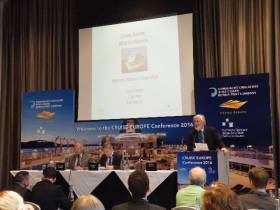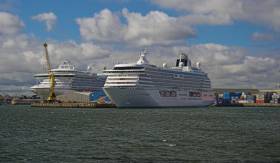Displaying items by tag: Cruise Europe Conference
#CruiseEuropeConference - In the same week of the Cruise Europe Conference held in Dublin for the first time, another first took place in the port as piles were sunk for the €227m Alexandra Basin Redevelopment (ABR) project enabling much larger cruiseships to berth, writes Jehan Ashmore.
Around 200 delegates of CEC 2016 (which has members within northern and Atlantic Europe) who gathered at the Gibson Hotel overlooking Alexandra Basin, heard Eamon O’Reilly, chief executive of Dublin Port Company, speak of the ABR project. The port is expected to see a doubling of cruiseships visiting the capital over the next decade.
As part of the ABR project much larger cruiseships of up to 330m long will be permitted to turn within the harbour and berth closer to the city-centre at a new terminal. The custom built double berth facility costing €30m will be a first for a port that in 2016 is scheduled to bring 113 cruise ship calls to Dublin this year compared with last year’s total of 93.
Chairman of Cruise Europe Captain Michael McCarthy said “the challenge is to step up to the market to accommodate these ships and investment in such facilities to handle these ships”
Last year the cruise industry carried an estimated 23m passengers generating $125 billion dollars and supporting 930,000 jobs. There were 300 plus cruiseships sailing the world’s oceans with a combined capacity of around 346,000 passengers. This is the 15th successive year of increased global cruise tourism figures and in the period February-April 2016, there was a 16% rise compared to the same period last year. Due to security issues, however in the middle-east some operators have had to cancell cruises in the region.
Keynote speaker of CEC, David Dingle, Chairman of Carnival UK, regarded as the ‘godfather of the industry’ spoke of the unprecedented growth of new and ever larger ships. In total there are 61 cruiseships (185,000 lower berths capacity) currently on the order books between 2016 and 2023. The total gross tonnage is of 7.68m and an estimated investment total of $43.5 billion dollars. That's a 44% capacity growth over 2015 or 6.5% per annum.
The chairman, who paid a visit on board one of the Carnival brands, P&O Cruises Arcadia while at anchorage off Dun Laoghaire Harbour in 2013, also highlighted at the conference that if you were to order a cruiseship now, the newbuild would not be available until 2021. Among the trends for these huge ships is that the average passenger accommodation capacity is 3,000 lower beds and reaching up to a maximum of 5,000 beds.
Dingle added that the trend for mega ships has led to further new on-board cruise 'experience' concepts.
Other delegates from small ship luxury operators spoke of a common theme in that cruise-goers wanted to be have extended port of call stays and overnights. In addition to having an emotional experience of their visits by engaging more so with locals, be it with artists, those in an expert field and in tracing their family roots.
The demand for cruising continues as China looks set to overtake Europe as the world’s second largest regional source market around 2025.
As for the Caribbbean there is pressure for new destinations outside this region. On the other side of the world Australasia has benefitted as larger tonnage has been deployed and new tonnage planned. Going against this trend is notably Brazil, one of the BRICK countries, which has encountered a succession of negative factors from developing this market due to its economic climate, health scares over the Zika virus and political instability.
Among the conference conclusions, critically is that the industry will find it difficult to keep up with the demand to 2025 even with record levels of investment, if present trends are implemented.
Added to the mix is the design of cruiseships in meeting Emissions Control Area (ECA) regulations that came into force in 2015 to reduce sulphur limits in fuel to 0.10%. This will result in vessels operating from the English Channel through the North Sea into the Baltic from 2015, to have increased operating fuel costs of over 50%.
Cruiseships that are LNG powered ships will also need to have associated port related infrastucture in place and that port regulation requires further implentation on a global scale. Also the public perception of such ships requires addressing.
Delegates were also told the very large cruiseships already in service have issues with port terminal infrastructure. As older built terminals posed challenges in not updating gangway designs to sufficiently cater for these high-sided newbuilds.This in turn reflects the time required to embark and disembark passengers.
#KeynoteSpeaker - Carnival UK's chairman David Dingle, will be the keynote speaker at the Cruise Europe Conference (CEC) in Dublin next month. He will present the ‘State of the Industry in Europe’ on the morning of May 31.
Dublin Port Company recently launched Cruise Dublin, a cruise development and marketing agency, in March. It will work with its members from retail outlets, visitor experiences and tourism bodies to promote Dublin. Cruise tourism is growing at 20% a year.
Pat Ward, head of corporate services DPC, said: “We want to promote Dublin as a premium cruise destination directly to cruise companies and work with businesses in Dublin to tailor packages to the needs of the cruiselines and their passengers.”
For passengers who want to explore on their own a Cruise Dublin Visitor Card is being developed.

























































